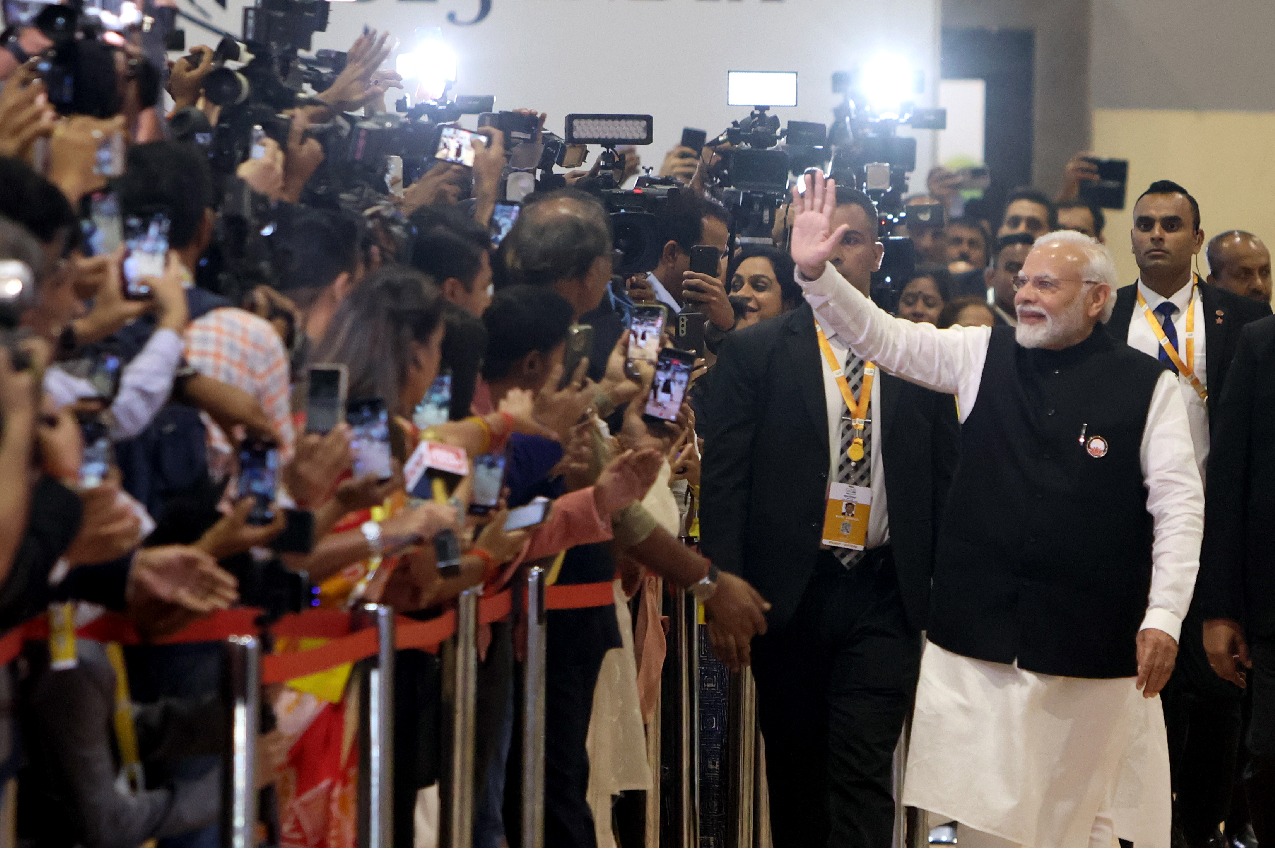Chinese daily acknowledges India's economic progress, improved international relations

New Delhi, Jan 5: In a rare commendation, China's leading daily Global Times acknowledged India's significant strides in economic development, social governance, and foreign policy.
In an op-ed penned by Zhang Jiadong, Director of the Center for South Asian Studies at Fudan University, the author noted that India "no longer only regards cultural tradition as a channel to achieve its own interests or as a symbol to attract foreign tourists, but also sees it as one of the pillars of India's status as a great power".
India has achieved "outstanding results in economic development and social governance, and its great power strategy has moved from dream to reality", Jiadong said highlighting New Delhi's achievements in the past four years.
According to him, India's economy has gained momentum and is on track to becoming one of the fastest-growing major economies.
Sharing his experience about his conversation with Indian representatives during his recent visit to India, Jiadong noted in the article that the attitude of Indian scholars was "more relaxed and moderate" toward Chinese scholars, instead of being "stubborn at times".
"For example, when discussing the "trade imbalance" between China and India, Indian scholars used to primarily focus on China's measures to reduce the trade imbalance. But now they are placing more emphasis on India's export potential, actively seeking to reduce the trade deficit with China by taking the initiative and increasing Chinese imports from India," he said.
"Furthermore, with its rapid economic and social development, India has become more strategically confident and more proactive in creating and developing a 'Bharat narrative'," the author noted.
About New Delhi's foreign policy, Jiadong said, "Since Prime Minister Narendra Modi assumed power, he has advocated for a multi-alignment strategy, promoting India's relations with the US, Japan, Russia and other countries and regional organizations. Now, India's strategic thinking in foreign policy has undergone another change and is clearly moving toward a great power strategy."
"Regarding the Russia-Ukraine conflict, India has distanced itself from the West and aligned itself more closely to the developing world. At the same time, India's reservations about Western powers have significantly diminished, and its activities within Western countries have become more frequent, extending beyond organizing large-scale diaspora events," he added.
Jiadong also said that India "not only seeks to escape the 'political dwarf' resulting from its history as a colony, but also wants to act as a 'world mentor' both politically and culturally".
"India has always considered itself a world power. However, it has only been less than 10 years since India shifted from multi-balancing to multi-alignment, and now it is rapidly transforming toward a strategy of becoming a pole in the multipolar world. The speed of such changes is rarely seen in the history of international relations," he said.
"India is indeed a major power, and rapid changes in internal and external strategies pose challenges to both itself and the international community. It appears that a transformed, stronger, and more assertive India has become a new geopolitical factor that many countries need to consider," he concluded.
In an op-ed penned by Zhang Jiadong, Director of the Center for South Asian Studies at Fudan University, the author noted that India "no longer only regards cultural tradition as a channel to achieve its own interests or as a symbol to attract foreign tourists, but also sees it as one of the pillars of India's status as a great power".
India has achieved "outstanding results in economic development and social governance, and its great power strategy has moved from dream to reality", Jiadong said highlighting New Delhi's achievements in the past four years.
According to him, India's economy has gained momentum and is on track to becoming one of the fastest-growing major economies.
Sharing his experience about his conversation with Indian representatives during his recent visit to India, Jiadong noted in the article that the attitude of Indian scholars was "more relaxed and moderate" toward Chinese scholars, instead of being "stubborn at times".
"For example, when discussing the "trade imbalance" between China and India, Indian scholars used to primarily focus on China's measures to reduce the trade imbalance. But now they are placing more emphasis on India's export potential, actively seeking to reduce the trade deficit with China by taking the initiative and increasing Chinese imports from India," he said.
"Furthermore, with its rapid economic and social development, India has become more strategically confident and more proactive in creating and developing a 'Bharat narrative'," the author noted.
About New Delhi's foreign policy, Jiadong said, "Since Prime Minister Narendra Modi assumed power, he has advocated for a multi-alignment strategy, promoting India's relations with the US, Japan, Russia and other countries and regional organizations. Now, India's strategic thinking in foreign policy has undergone another change and is clearly moving toward a great power strategy."
"Regarding the Russia-Ukraine conflict, India has distanced itself from the West and aligned itself more closely to the developing world. At the same time, India's reservations about Western powers have significantly diminished, and its activities within Western countries have become more frequent, extending beyond organizing large-scale diaspora events," he added.
Jiadong also said that India "not only seeks to escape the 'political dwarf' resulting from its history as a colony, but also wants to act as a 'world mentor' both politically and culturally".
"India has always considered itself a world power. However, it has only been less than 10 years since India shifted from multi-balancing to multi-alignment, and now it is rapidly transforming toward a strategy of becoming a pole in the multipolar world. The speed of such changes is rarely seen in the history of international relations," he said.
"India is indeed a major power, and rapid changes in internal and external strategies pose challenges to both itself and the international community. It appears that a transformed, stronger, and more assertive India has become a new geopolitical factor that many countries need to consider," he concluded.